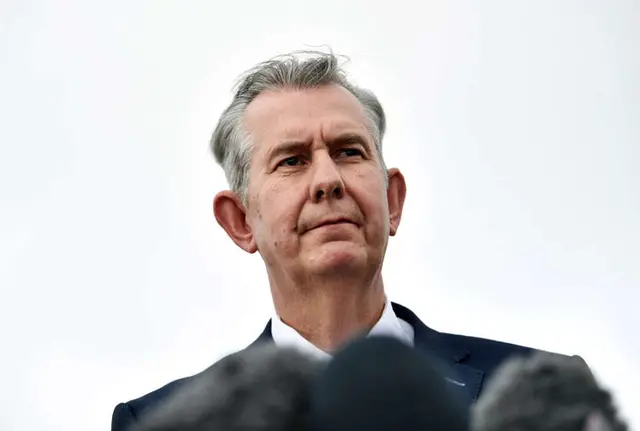Democratic Unionist Party leader Edwin Poots is stepping down as leader of Northern Ireland’s biggest political grouping after just three weeks amid a revolt that throws into question the future of Belfast’s power-sharing executive.
Thursday’s announcement came hours after the U.K. government said it would push laws through Westminster giving more weight to the Irish language -- a policy resisted by the DUP, but a condition of Sinn Fein’s for it to continue power sharing. Poots triggered a mutiny by not fighting back against London on the issue. Instead, he went ahead and nominated the DUP’s Paul Givan to serve as First Minister alongside Michelle O’Neill, Sinn Fein’s nominee for deputy first minister.
His exit adds to the growing pressure on the DUP, which has seen its support decline in opinion polls as Brexit, and the economic border in the Irish Sea that came with it, disrupted trade and led to violence. In April, the party ousted Arlene Foster as leader, in part for her role in creating a barrier between Northern Ireland and the rest of the U.K.
Poots’s departure is a “total disaster” for a party that was only a short time ago the dominant force in Northern Irish politics, according to Peter Cardwell, a former special adviser to two Northern Ireland Secretaries in the U.K. government.
“Now you’ve got a party which is wondering, if there were an election tomorrow, whether they would even be the third largest party in Northern Ireland after Sinn Fein and the Alliance party,” Cardwell said. Poots’s only legacy “is that an Irish Language Act will now definitely happen -- which is something a lot of DUP members and voters will not be in any way happy about.”
It’s unclear whether Givan will remain as first minister. His departure could trigger the collapse of the Northern Ireland Assembly. Elections to the devolved government are due to be held next year.
In a statement, Poots said he would remain as party leader until his successor is elected. Among the expected contenders to replace him is Jeffrey Donaldson, a more moderate figure who leads the DUP’s lawmakers in Westminster. He narrowly lost the leadership election in May with 17 votes to Poots’s 19.
Donaldson was among those who signed an email to Poots earlier today urging him to hold off nominating Givan, according to RTE. Other signatories included former deputy leader Nigel Dodds, who had been seen as a contender to replace Foster, and Sammy Wilson, the broadcaster said.
“Donaldson would not have made Poots’s mistake,” said Edward Burke, an assistant professor of International Relations at Nottingham University who is researching the effect of Brexit on the British-Irish security relationship. “His political acumen for what the base will or will not tolerate has rarely failed him.”
The political fallout has already begun. Friday’s meeting of the North-South Ministerial Council -- a joint body established under the 1998 Good Friday Agreement -- was postponed at the request of Belfast, Irish Prime Minister Micheal Martin’s office said in a statement.
The meeting in Armagh City, Northern Ireland, was to be attended by Givan and O’Neill. Instead, concerns surround the future of the power-sharing arrangements.
“Neither the DUP or Sinn Fein can politically afford to back down now,” said Burke. “This is a recipe for political deadlock at a time of deepening tensions.”
(BLOOMBERG)
 简体中文
简体中文

